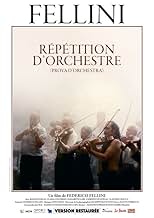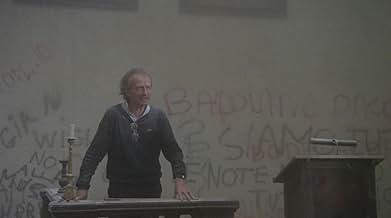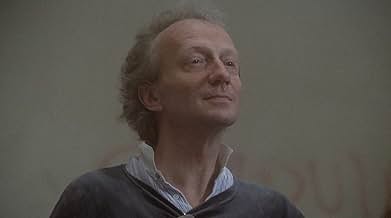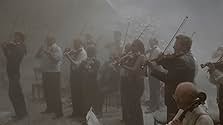IMDb RATING
7.1/10
5.3K
YOUR RATING
An orchestra assembles for a rehearsal in an ancient chapel under the inquisitive eyes of a TV documentary crew, but an uprising breaks out.An orchestra assembles for a rehearsal in an ancient chapel under the inquisitive eyes of a TV documentary crew, but an uprising breaks out.An orchestra assembles for a rehearsal in an ancient chapel under the inquisitive eyes of a TV documentary crew, but an uprising breaks out.
- Awards
- 1 win & 2 nominations total
Nando Villella
- Cello player
- (as Ferdinando Villella)
Franco Javarone
- Bass tuba player
- (as Giovanni Javarone)
Andrew Lord Miller
- Oboe player
- (as Andy MIller)
Cesare Martignoni
- Clarinet player
- (as Cesare Martignon)
Filippo Trincia
- Head of orchestra
- (as Filippo Trincaia)
Featured reviews
Fellini's "Prova d'orchestra" was originally made for television, and there it should have stayed. As a cinematic event, it does not deliver. Yes, it's well directed and nicely acted, it has an interesting idea in it, but it's not enough for me to enjoy it. Eventually it looks like an exercise by some cinema student and not like a piece by Fellini, one of a few cinema genius of our time. I was disappointed, even though I enjoyed parts of it. My Grade: *** (out of *****)
Some fully creditable critics deemed "Prova d'orchestra" as being Fellini's main masterpiece. Although recognizing their slight exaggeration, I still can fully empathize with their point. The movie is one of the most intelligent, stylish and personal instances of the much used (and abused) recipe of the "social microcosm". Of course, Fellini's trick to build up a parable of society by using the orchestra parallel is not only original, but also very efficient: the metaphors and symbols resulting from this are both powerful and humorous, in an atrociously satyric vein.
Also, it's very interesting to note the gradual glissando from realism to hyperbole, and from cold detachment to paranoid hysteria; as such, what started as a pseudo-documentary, impartial and technical, gradually turns into a major pandemonium, to culminate with the hallucinatory profiling of the demolition iron ball, as an omen of doom - that being the point where the artist really meets the divine, both as meaning, and as means.
One should also notice the masterfully style of shooting the orchestra, the people and the instruments, to build up the cinematographic symphony layered over the musical one, and to create that irresistibly fast-paced narrative in images, that makes the movie so exciting and captivating - it's literally to be watched on the edge on your seat, although nothing more spectacular happens than an orchestra rehearsing in a disaffected church... all being the result of Fellini's skillful cinematography.
At last, one couldn't depart any reference to this masterpiece without mentioning at least in passing the haunting finale. Although I always regarded with political objectivity and historical honesty the national-socialist ideology, goals and means, I must confess that I fully assimilate Fellini's powerful warning about any dictatorial excesses. Balduin Bass' voice rising in a Hitlerian monologue is an efficient and pointed mean of expression and style - and his last line after fade out, "Signori... Da capo!", indeed MAKES A POINT!
Also, it's very interesting to note the gradual glissando from realism to hyperbole, and from cold detachment to paranoid hysteria; as such, what started as a pseudo-documentary, impartial and technical, gradually turns into a major pandemonium, to culminate with the hallucinatory profiling of the demolition iron ball, as an omen of doom - that being the point where the artist really meets the divine, both as meaning, and as means.
One should also notice the masterfully style of shooting the orchestra, the people and the instruments, to build up the cinematographic symphony layered over the musical one, and to create that irresistibly fast-paced narrative in images, that makes the movie so exciting and captivating - it's literally to be watched on the edge on your seat, although nothing more spectacular happens than an orchestra rehearsing in a disaffected church... all being the result of Fellini's skillful cinematography.
At last, one couldn't depart any reference to this masterpiece without mentioning at least in passing the haunting finale. Although I always regarded with political objectivity and historical honesty the national-socialist ideology, goals and means, I must confess that I fully assimilate Fellini's powerful warning about any dictatorial excesses. Balduin Bass' voice rising in a Hitlerian monologue is an efficient and pointed mean of expression and style - and his last line after fade out, "Signori... Da capo!", indeed MAKES A POINT!
It is rather neglected a movie by Fellini, but I agree with those who see it as a 'metaphor' of the Italian society; not of the Italian society in general, but of the Italian society at the end of the '70s. After 1968, there was turmoil in the country and the artist's message is quite clear, apparently: prolonged social strife can lead to dictatorial outcomes. The message is not so clear at the beginning of the film and it might be seen as a sort of a 'documentary', but when that huge stone 'ball' starts pounding on the building where the 'orchestra' are rehearsing and a faraway voice starts becoming more and more clear and strong, Fellini's message becomes obvious.
10Ymir4
This is likely the finest make-believe documentary that I have ever seen. The setting is a rundown Medieval Roman chapel, now an oratorio where an orchestra gathers. A television crew is making a documentary about this orchestra (while the orchestra is dealing with a union dispute). The bulk of the film's first half focuses on individual musicians, many of whom reminisce about their first encounter with the instrument they play. When the musicians talk about their instrument, they often share thoughtful and stimulating metaphors about the meaning and the function of their instrument. There are a few times during the film where the action is interrupted by a large rumble in the building. We don't know what this is exactly until the end of the film. The film transforms from poetic, to pure comical delight, to complete chaos, to lyrical beauty when the musicians play the music.
Composer Nino Rota's contribution was an immense one. He composed all of the pieces the musicians play in the film, and I believe they the music is absolutely wonderful (my personal favorite of Rota's compositions for "Orchestra Rehearsal" being the final piece the orchestra performs). This was the last time Rota scored a Fellini film, he died the next year.
I also must comment on the top-notch cinematography, which is quintessentially Felliniesque (ex. incredible long shots of the orchestra playing, shots of musicians lined up in very particular angles, and a couple of sweeping pans).
Anybody who loves orchestral music will like this film to some degree. I happen to immensely love Fellini, Rota, AND orchestral music, so for me, this film is nothing short of absolutely marvelous entertainment!
Composer Nino Rota's contribution was an immense one. He composed all of the pieces the musicians play in the film, and I believe they the music is absolutely wonderful (my personal favorite of Rota's compositions for "Orchestra Rehearsal" being the final piece the orchestra performs). This was the last time Rota scored a Fellini film, he died the next year.
I also must comment on the top-notch cinematography, which is quintessentially Felliniesque (ex. incredible long shots of the orchestra playing, shots of musicians lined up in very particular angles, and a couple of sweeping pans).
Anybody who loves orchestral music will like this film to some degree. I happen to immensely love Fellini, Rota, AND orchestral music, so for me, this film is nothing short of absolutely marvelous entertainment!
I read some people saying that this film made no sense, and that it's just a orchestra rehearsal; it hurst how wrong they are. As any other Fellini, you have to scratch the surface, and you will find a great meaning. That's what I love about his films, they make you think! If you think nothing happened in this movie, go watch a Transformers film, you'll probably thing that there's a lot going on while there's nothing at all. While it may lack Fellini's characteristic powerful visuals, it has a very powerful meaning about politics, society and life. Awesome movie, and great for it's lenght
Storyline
Did you know
- GoofsWhen they are interviewing the first violinists, the harpist in the background is clearly not playing but harp music is audible.
- ConnectionsFeatured in In Search of Fellini (2017)
- How long is Orchestra Rehearsal?Powered by Alexa
Details
- Release date
- Countries of origin
- Languages
- Also known as
- Federico Fellini's Orchestra Rehearsal
- Filming locations
- Production companies
- See more company credits at IMDbPro
- Runtime1 hour 12 minutes
- Sound mix
- Aspect ratio
- 1.37 : 1
Contribute to this page
Suggest an edit or add missing content





























